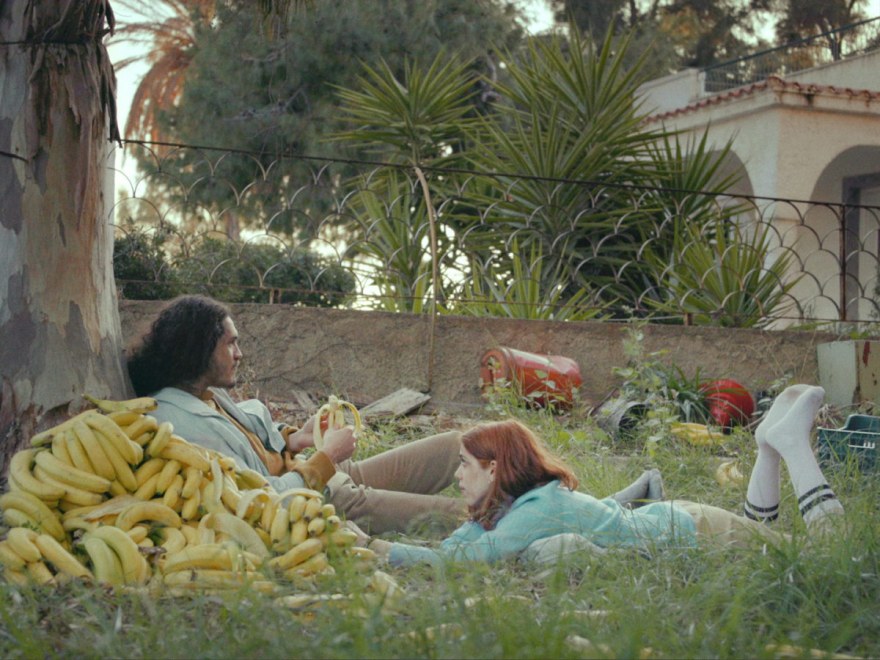Dinner with Copa-Loca
An interview with Christos Massalas, director of Copa-Loca
An obvious question to start with: is the resort real? If not, what was the inspiration for Copa-Loca? Can you tell us about the filming location?
Copa-Loca is a fictional resort; it is a synthesis of different locations that I found around Athens. It all began when I discovered an abandoned water park, close to an industrial zone in the outskirts of the city. There was great cinematic potential in that place, which was now devoid of purpose. In the absence of human activity, the park looked like a monument, with its waterslides standing tall like giant futuristic sculptures. I wanted to explore this landscape and started thinking about a story that would take place there. I came up with the idea of Copa-Loca, an abandoned tourist resort, with the waterpark at its center. And little by little, I brought in fragments of different locations I found in order to create the town of Copa-Loca.
Why is it abandoned? Is it just because it’s off season?
In the film, we see Copa-Loca in a transitional season. It is neither summer nor winter; the clothes are thick, but the sun is shining bright. Everything has somehow prematurely decayed, as if through some strange chemical process. In reality, the waterpark closed down a few years ago due to financial complications, like many similar entertainment venues in Greece. Consequently, the country’s financial instability brought a cultural shift in lifestyle. On the one hand, some of these large-scale venues could not be preserved practically and, on the other hand, they were associated with a hyper-consumerist way of living that was no longer relevant or possible to the same extent. And this is, I assume, not just a Greek matter.
Is Paulina based on someone specific? How would you describe her role within that community?
Paulina is a fictional character. Of course, when you create a character, you channel your own experiences and observations. But the beauty of fiction is that you can connect dots that were unconnected before and create new shapes and characters. Paulina is one of the few remaining residents of the resort, living in the ruins. She is “the girl at the heart Copa-Loca”, she places herself in the center of it all as the apple of discord. She wants to please and to be pleased, but she belongs to no one exclusively. She is in constant motion and never settles; and by not settling, she keeps the community alert, a community that would otherwise go into hibernation.
What is the deal with bananas?
The residents of Copa-Loca feed on bananas, in lack of anything else. Bananas are just bananas. But whenever they appear on screen they acquire a symbolic value – whether you intend it, or not. What’s interesting about bananas is that they are a cloned fruit, which means that most bananas we eat are genetically identical to each other. So, in a way, bananas have solved their reproductive issues, they can be replicated indefinitely. But the problem is that, if one banana catches a disease, then the whole banana civilization will vanish. It’s an interesting case of evolution. But then, bananas are just bananas.
Can you tell us about the personal context in which you made the film?
My films are always personal in a way and yet they are fiction. I start with an urge to make a personal declaration of some sort. In the beginning, I don’t know what it is I want to declare and I don’t know if it will be of any relevance to others. It’s a mysterious inclination. It’s as if you have a certain feeling, which is abstract, and you’re looking for something – a place, a face, a figure – that will provide definition to this abstract notion. And the moment you find this fixating element is what we’ve come to call “inspiration”. And it is the moment when the personal and private finds its opening to the realm of fiction. So, through this strange process of fiction, the film tells more about me than I could put into words right now.
What sort of freedom would you say the short format allows?
The short film is a poetic medium. It allows you to experiment, to be playful. A short film is like a brief encounter. In a brief encounter everything counts, every small detail; every gesture, every glance and every word that is uttered. It has to ring true even if it can’t be justified. It’s a whole life condensed into a few instances. So when you make a short film, you know that you have to make the fullest of every impression – and to do that you have to be fearless. That’s how I see it. And this is also related to the way in which short films are made, at least the way in which I have made them, with little resources and with only a short amount of time to shoot. You don’t have much, but you have a precious moment of freedom.
If you’ve already been to Clermont-Ferrand, could you share with us an anecdote or story from the festival? If not, what are your expectations for this year?
I attended Clermont-Ferrand in 2012 as a participant for the Euro Connection Forum. That was shortly after I graduated from film school, so it was one of my first festival experiences. It was great to be there and to see all the filmmakers and the people who are passionately working for short films, some of whom I’ve been associated with ever since. Now, I’m returning to Clermont-Ferrand after a long festival run with my short films, just as I’m about to embark on my first feature. So it almost feels like closing a circle. I’m happy to return.
Copa-Loca is being shown in International Competition I10.









